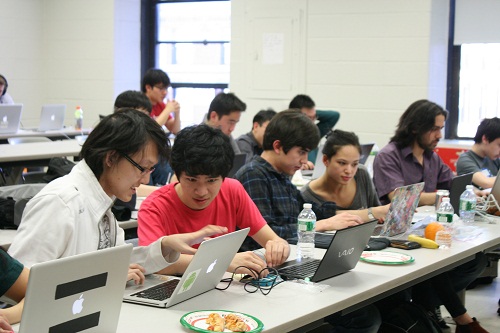Just the other day I wrote an article for beijingkids titled “What in the World”. In that article I reflected on, generally speaking, what had changed in the world from when I was younger. Needless to say, a lot has changed, some better, some worse. The next morning I woke to read about the outcome of the Harvard Graduate School of Education’s (HGSE) project Turning the Tide of College Admissions.
In the course of several hours everyone from pundits to counselors made some comment or wrote and article or post about the recommendations found in the projects findings. Needless to say, the comments range from positive to negative to “let’s wait and see”. I didn’t really want to write a response initially because of several reasons. 1. There are smarter, more attuned people than me, I didn’t want to jump into the conversation before giving my thoughts more time to coalesce. 2. I feel it is important to wait and see what other people are thinking before I attempt to put my thoughts down. Basically, I didn’t want to write a knee jerk reaction.
Thinking about my own career over the last 20+ plus years it was important to think about how times have changed. One used to be able to pretty much determine, with relative certainty, whether a particular student had a chance of admission to a “top” school. Those were the days when admission rates to top schools are far above the current single digits. In 2002, when I was President of the Overseas Association of College Admission Counselors, there was an article that came out from the Ivy League and closely related schools about the disturbing trend they were seeing in their applicants – overburdened, high achieving and burned out when they arrived on campus for their freshman year. In 2004, a friend and colleague, started an organization called The Education Conservancy a non-profit organization, which among other things decried the burgeoning industry of subsidiary companies facilitating admission from U.S. News Ranking (and many others), test prep companies to educational consultants among other things. Mr. Thacker, foresaw what was coming along with AO’s at top colleges. Not much changed, in fact, things have gotten worse.
Over the intervening time students and their families have employed a wide array of resources to secure the ever-challenging Holy Grail – admission to the top schools in the US and elsewhere. As admission rates fell, students and their parents dove further into trying to figure out how to gain entry. Colleges responded by touting key ideals – rigor, passion, grit, leadership, and so forth. Students responded trying to meet or even buy these ideals. The never-ending cycle kept moving faster and further from the intended purpose – learning for the sake of learning, pursuing the journey of life. It became a competition, with everyone trying to out do, out study, out perform the perceived competition.
Full throttle forward to 2014 and a change came – the Common Application decided to update their system wreaking havoc on colleges and high schools due to software issues. Rampant accusations of cheating on SAT began to emerge, admission rates dropped as more and more students were vying for fewer places. People began to complain that only the privileged gained access to top schools. Underrepresented students never had a chance. Reports of mental health issues of students with depression, suicidal tendencies and worse came more and more often. The rankings supported this frenzy, the competition supported the frenzy and the frenzy responded with more companies trying to promise the Yellow Brick Road.
Earlier this year at the National Association of College Admission Counselors Conference as group of representatives from 80 colleges and universities presented their solution to the insanity – The Coalition for Access, Affordability and Success. A new application system involving a Locker where students in Grade 9 could start building a repository of evidence over their high school years of their learning; meeting tasks and goals. A group of “mentors” would help guide and direct these students throughout the time and this “evidence” could be used in the application process. This is a general attempt to explain the system but the session at NACAC was highly criticized. Criticized because it felt like the lofty towers of Admission Deans missed totally what they were trying to achieve: a system to bring some sanity to the admission process, but most importantly to those students who were left out of the process – the underserved and underprivileged.
As a point, here in China agents and savvy consultants immediately began to offer/sell services to help student start their locker. Most recently, a college representative told me the Coalition system is being called the Life Time Employment Act of Educational Consultants. It seems to me that everyone, including the designers of the Coalition have missed the point completely. If the application system is geared to students who are underprivileged then why is it so technology and manpower intensive? Doesn’t this system make the process more complicated and more distant for those it is meant to serve? As we can see from the response in China, only the well off already know about the existence of an application system that does not even exist yet! Something is terribly wrong, and as I wrote last year in my article Is the Admission Process Broken, A China Perspective the whole admission process is out of date and out of context, particularly here.
And now we come to today and the report from HGSE and what it means to me. First off, it is not perfect. There are lots of things left out or not addressed – like the elimination of ranking. Second, the recommendations will not help 2.4 GPA students with lackluster test scores get into the Ivy League. Third, it is a broad stroke set of recommendations for people to stop and think about this thing we call education, learning and I hope a conversation about being a socially responsible human in a global society. Fourth, it is in the right direction and it comes, perhaps too late, but it is a start. Finally, while it will not solve the immediate problems, I can only hope it starts a dialogue, a positive dialogue about the journey of education.
So what does this really Turning the Tide really mean? I can only speak about how I currently see it today. I think we have lost perspective on what education and learning are all about. We have forgotten that learning is a life long journey, not a competition. Students have been pushed toward goals that look good, but are not invested in. They ask “What do I need to do to get in to X?” and in doing so have missed the whole point of education – to learn, to create, the enjoy. In many aspects they ask this question too late. What I hope Turning the Tide will do is engage people in thinking about humanity and the society they will inherit.
This last Fall I attended a conference where a colleague presented about the admission process. He mentioned that the question he asks his students is as follows – What change do you want to make? I have adapted it a little to this: What change do you want to make in your life and the world you will inherit? What skills do you have or need to have to begin to make that change? I feel that the recommendations in the Turning Tide project begin to address those questions. The recommendations ask students to not think of themselves, but how they can benefit others and how they can look at the world through a different set of lenses than “how do I get the most.”
The world is a mess and has been for many generations. We are at a turning point – pollution is out of control, wars and religious strife affect almost every corner, the 1%ers are increasing and the rest are gasping, in varying degrees. The colleges that are part of the Turning Tide project and Making Caring Common are taking on a huge task – trying to get students to be more mindful and yet sensitive to the things that will change the direction of the world we live in and hopefully what is coming. By asking students and society at large to embrace the common good forces us not look to our personal success, but how can I make my world, however big or small, better. What Making Caring Common is asking is that we starting taking responsibility for ethical engagement while focusing on intellectual achievement. They are asking us to be responsible, caring citizens. They are asking us to engage. Engage in the process of learning, developing solutions but at the same time slowing down, redefining achievement.
As we look to the future, the question is what comes next? What I think comes next is how students answer the question – What change do you want to make in your life and the world you will inherit? What skills do you have or need to have to begin to make that change? The answers are not that difficult. But the resolve takes courage to put actions in place. It takes failure, trust and leadership to make change happen. It takes sensitivity and it takes time. No culture was developed in a day or overnight. The culture of college admissions will not change overnight. Intellectual curiosity, self-evaluation and being a change maker are much the same. They take time to develop.
So while Turning the Tide does not solve all the problems with a broken admission process, it is a start. The conversation started long before the publication of their project but now there is some guidance. It is for the rest of us to take charge.




